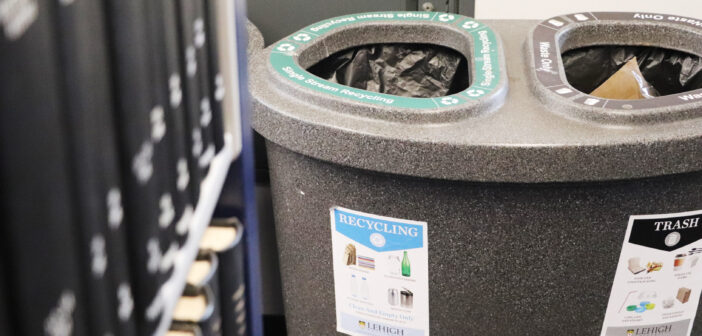Since 2020, Lehigh has implemented changes to recycling and sustainability practices on campus.
According to Lehigh’s Recycling Program, 27 solar-efficient trash and recycling sets are spread across the Mountaintop and Asa Packer campuses.
These electronically-powered bins notify the waste management staff when they are at capacity and are labeled to decipher which items belong in each bin to reduce the chance of contamination.
The Office of Sustainability’s Recycling Poster states paper, plastic bottles, cardboard, glass and metal containers, and empty plastic bags are the only recyclable items.
Dan O’Brien, associate director of Custodial, Grounds and Athletics, said his department manages the waste contracts on campus, which include single-stream recycling, cardboard, metals, construction demo and yard waste.
“There was a major change in single-stream recycling about four to five years ago,” O’Brien said. “This increased the importance of reducing contamination and limiting the types of material that are successfully recycled.”
O’Brien said relaxing the viable amount of contamination would increase the success of recycling progress. But, he said a more standard practice applied throughout the industry would lead to a better understanding of what and how to recycle properly.
Sarah Wilhelm, ‘25, works in the Office of Sustainability on the Events and Special Projects team and helps organize campus-wide events to increase sustainability awareness.
Some projects include working to reduce water usage and decrease the overconsumption of goods.
“We had a speaker at one of our meetings who said the amount of single-stream recycling that Lehigh is taking out has decreased over the last few years,” Wilhelm said. “People are recycling less on campus, so we need to really take a look at what we are consuming to stay sustainable as students.”
Lehigh has taken measures to lower the chance of trash contamination, Wilhelm said. Specifically, the university purchased black trash bags and clear recycling bags so staff can quickly decipher if trash is correctly separated.
She said Lehigh does a good job labeling recycling bins, but thinks the problem roots back to the effort students are willing to put in.
“The next steps to keep Lehigh’s recycling efforts high include students understanding exactly what can and cannot be recycled,” Wilhelm said. “Some common mistakes include recycling greasy pizza boxes and filled plastic bags.”
Samantha Anderson, ‘26, an Eco-Rep, said meetings are spent discussing different ways to reduce waste and introducing new initiatives to get students more engaged in recycling.
Anderson said there are discrepancies throughout Lehigh’s recycling policies. While the effort is being made, she said other parts of the system need to be cleaned up to increase effectiveness across campus.
“As soon as a recycling bin is contaminated, it makes it extremely difficult to recycle effectively, as a contaminated bin may not end up being recycled,” Anderson said. “It’s one of my jobs every week, where I have to go to every level of my residence hall and see if a waste disposal closet is either contaminated or clean.”
Anderson said her office has active projects on campus designed to reduce waste, including introducing reusable eco-containers at dining locations.
According to a Lehigh Sustainability Initiative, students who are not using eco-containers are throwing away between 69 and 83 disposable containers each semester.
“When I host building events on sustainability and recycling, I don’t really get a lot of engagement from students,” Anderson said. “I definitely want to keep trying to find ways to make people more aware of the impacts of what they’re consuming and how they dispose of their waste.”
To learn more about sustainability and recycling initiatives on campus, the Sustainability 2020-2030 Strategic Plan outlines Lehigh’s climate-conscious goals over the next six years.






Comment policy
Comments posted to The Brown and White website are reviewed by a moderator before being approved. Incendiary speech or harassing language, including comments targeted at individuals, may be deemed unacceptable and not published. Spam and other soliciting will also be declined.
The Brown and White also reserves the right to not publish entirely anonymous comments.